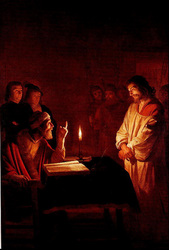The Eucharist: Salvation, Life, and Resurrection

Tuesday of Holy Week
Isaiah 49:1–6
Psalm 34:13, 1–2
John 13:21–33, 36–38
Go and Prepare the Passover for Us
Sunday’s solemn chant of the Passion according to Saint Luke cast the whole of this Great and Holy Week in a Eucharistic light. I was moved to hear Jesus say, not only to a certain man in the city, but to me, and to us, “Go and prepare the Passover for us, that we may eat it” (Lk 22:8). For once the disciples were quick to obey: “And they went, and found it as He had told them; and prepared the Passover” (Lk 22:13). They must have sensed an urgency in their Master’s voice; they must have read on his face something of the desire for this pasch that blazed in his heart: “With desire I have desired to eat this pasch with you, before I suffer” (Lk 22:15).
The Body and Blood of Christ
Saint Luke’s account of the Passion began with the wondrous account of the institution: “And He took bread, and when He had given thanks He broke it and gave to them, saying: ‘This is My Body which is given for you. Do this in remembrance of Me. And likewise the chalice after supper, saying, ‘This chalice which is poured out for you is the New Covenant in My Blood’” (Lk 22:19–20). It was impossible to hear these words on Sunday and not sense that they were given us, in some way, as a key to the rest of the week and to the Paschal Triduum.
The Eucharist and the Cross
Today’s Introit was the very one that we will sing on Maundy Thursday on the threshold of the Sacred Triduum: “It is for us to glory in the Cross of our Lord Jesus Christ, in whom is our salvation, life, and resurrection: through whom we have been saved and set free” (cf. Gal 6:14). We are given it today in a kind of contemplative rehearsal of the mysteries that will unfold. We are to sing it, and to hear it, in a Eucharistic key. We glory in the Eucharist as we glory in the Cross because the Eucharist is the sacramental demonstration of the Cross. Is this not what the Apostle teaches? “For as often as you shall eat this bread, and drink the chalice, you shall show forth the death of the Lord, until he comes” (1 Cor 11:26). The Eucharist makes present the Cross. The Eucharist is the sacrifice of the Cross set before the eyes of faith, not as something dim and ineffectual, but as an astonishing inbreaking, here and now, of “the power of God and the wisdom of God”(1 Cor 1:24). This is the source of our “Eucharistic amazement.” This is this realization that leaves us, together with the saints of every age, “lost, all lost in wonder.”
O Great Passion
The Eucharist is the awful reality of the Christus passus. The mystery of the suffering Christ is made present to us and for us. For our healing, his wounds are pressed against ours. For our cleansing, his Blood flows impetuous like a torrent. For our life, his breath is given over in death. The Eucharist is the Crucified “lifted up and drawing all men to himself”(cf. Jn 12:32). It is the Eucharist that causes us to cry out, “O great Passion! O deep wounds! O outpouring of Blood! O death suffered in every bitterness, give us life.”
Salvation, Life, and Resurrection
We glory in the Eucharist as we glory in the Cross because it is “our salvation, life, and resurrection.” Each of these three words — salvation, life, and resurrection — is eucharistically, that is to say, sacramentally, realized for us daily in the Mass. Wheresoever the Holy Sacrifice is offered, “from the rising of the sun to its setting” (Mal 1:11) the sick receive salvation, those claimed by death are infused with life, and those already stopped earthward are raised to heaven.
Sacrament of Healing
The Eucharist is the sacrament of our salus: the word is so rich as to defy any one translation. It is our health and our healing, it is our peace and our well-being, it is our restoration to wholeness, the antidote for every evil, the remedy for every ill. The healing power of the Eucharist is so little understood, even by devout souls. The Eucharist heals souls, minds, and bodies. The woman weakened by a flow of blood for twelve years, “and who had suffered much under many physicians, and had spent all that she had, and was no better but rather grew worse” (Mk 5:26) was healed immediately upon contact with the garment that clothed the body of Jesus. Bring to the Eucharist every thing that weakens you, every anemia of the soul, mind, and body. Come, as Saint Thomas says, “as a sick man to the physician who will save his life.”
At the very moment of the invitation to Holy Communion the Church places on our lips these words and no others: “Lord, I am not worthy that you should come under my roof, but only say the word, and my soul shall be healed.” Lex orandi, lex credendi. The Church intends that we should approach Holy Communion seeking salus: health, healing, wholeness, and well-being. Among the prayers of the Roman Missal in preparation for Mass is one attributed to Saint Ambrose that has one say: “I fly to thee to be healed. . . . To thee, Lord, I uncover my wounds.” The unanimous testimony of the saints and the tradition of the Church is clear enough: the Eucharist is the sacrament of our healing.
Sacrament of Life
The Eucharist is the sacrament of our life. Here is the fulfillment of David’s prophecy: “wine to gladden the heart of man . . . and bread to strengthen man’s heart” (Ps 103:15). He who says, “I came that they may have life, and have it abundantly” (Jn 10:10) comes even now hidden beneath the sacramental veils of bread and wine. Life himself comes bringing life.. “I am the living bread which came down from heaven; if anyone eats of this bread, he will live forever; and the bread that I shall give for the life of the world is my flesh” (Jn 6:51).
The remedy for every diminishment of life is the Eucharist. “As the living Father sent me, and I live because of the Father, so he who eats me will live because of me” (Jn 6:57). Will live! Life is his promise to us, abundant life, divine vitality! One need not be dead like Lazarus, four days in the tomb and already stinking, to experience a certain inward deadening. There is that creeping deadness of the soul that the fathers and mothers of the desert call accedia. The soul suffering accedia becomes a dead weight to herself and sometimes to others. She becomes lifeless and indifferent; she begins to prefer the idleness of the barren woman to the labours of “the joyful mother of children” (Ps 112:9). Although she goes through the motions of living, her living is lifeless. The medicine for this pernicious lifelessness that at certain hours makes us lethargic, numb, heavy-footed, and slow is the Eucharist.

In any one of us, as in the ecclesiola of the monastery, and indeed in the whole Church, quality of life is directly proportionate to our acceptance of the grace offered us in the Most Holy Eucharist. “Every great reform,” says Pope Benedict XVI, “has in some way been linked to the rediscovery of belief in the Lord’s Eucharistic presence among His people” (Sacramentum Caritatis, 6). Look nowhere else for revitalization, but say with Peter, “Lord, to whom shall we go? You have the words of eternal life” (Jn 6:6:68).
Sacrament of Resurrection
The Eucharist is the sacrament of our resurrection and this not only on Easter, but every day. The Eucharist sets us on our feet before God. It lifts us up and puts bold words in our mouth, surprising us with the face-to-face of the Son with the Father. “I rose up and am still with thee: thou hast laid thy hand upon me. Thy knowledge has become wonderful to me” (Ps 138: 18, 5-6).
Who is in need of resurrection if not the soul that is bent earthward, the soul incapable of standing up straight so as to look into the face of God? “There was a woman who had a spirit of infirmity for eighteen years; she was bent over and could not fully straighten herself. And when Jesus saw her, he called her and said, ‘Woman, you are freed from your infirmity.’ And he laid his hands upon her, and immediately she was made straight, and she praised God” (Lk 13:12). Resurrection: she was made straight, and she praised God.
We approach the Most Holy Eucharist bent over, incapable of fully straightening ourselves; the sacrament of the Body and Blood of Christ does in us what we cannot do of and by ourselves. One cannot receive the Risen Christ and remain bent towards the things of earth. “If then you have been raised with Christ, seek the things that are above, where Christ is, seated at the right hand of God. Set your minds on things that are above, not on things that are on earth” (Col 3:1).
Out of Darkness and into the Light
You need not wait until Pascha to be lifted up, straightened out, and resurrected. In every Mass, in every Holy Communion, hear the voice of him who says, “I am the resurrection and the life” (Jn 11:25). Even more, hear the voice of him who calls you out of darkness into light, out of the tomb’s dank stench into the fragrance of new life: Lazare, veni foras! “Lazarus, come out” (Jn 11:43).

+Dear Father,
Have you ever studied the Jewish Passover meal, the Seder? Our dear friend, Egeria, gave us a very insightful class one year on it, and how the “Messianic Jews” celebrate it each year. Some highlights I will share here in the event that this is new knowledge to you. One can see how Our Lord, in the Most Holy Eucharist and in His Precious Blood,perfectly fulfilled the deep symbolism of the Passover meal.
The cup of wine which became Our Lord’s Most Precious Blood, is the third cup of the meal, taken after the supper and is called the “Cup of Redemption”. It symbolizes the blood of the Passover Lamb. There are four cups all together, each one with its unique meaning. Our Lord chose this one to become His Blood, because He is the True Passover Lamb.
The unleavened bread that became His Most Sacred Body is called the “Afikomen”, the “Coming One”.It is broken from the main piece of unleavened bread and saved and shared at the end of the supper (before the third cup). Judas would have not received This, but a morsel from the first unleavened bread, the “Matzah”.
It really pierces the heart to learn that the morsel Jesus gave to Judas was a symbol of HOPE.A piece of the matzah was dipped along with the bitter herbs in the “Kharoset” (a sweet mixture). It was eaten as a reminder that even the most bitter of circumstances can be sweetened by the hope we have in God. Our Lord was offering to Judas, with this morsel, a chance to turn from the path he was following and not to despair. Our Lord did everything to bring Judas back into the light. It makes it all the more tragic… (As St. Therese says: “This is TOO MUCH LOVE!”).